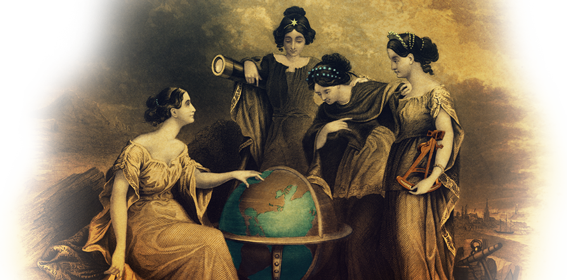Linguistic Competencies
How did Americans manage to communicate with the sundry peoples they encountered around the world? We first might ask what language did Americans themselves speak, write, and read? The priority in the aftermath of the American Revolution was not to globalize, but to nationalize: to create a distinctly American version of the English language.
Noah Webster devoted decades to this nationalistic undertaking, culminating in the 1828 publication of his famousAmerican Dictionary of the English Language. Webster sought to identify the words requisite for what he believed to be a revolutionary new political culture in the United States: a republic, as opposed to a European-style monarchy. What new words were needed for Americans to sustain and strengthen their political experiment?
The American version of the English language continued to evolve, not only from political ideology, but also from everyday usage. Another linguistic nationalist, John Russell Bartlett spent years collecting hundreds of colloquialisms original to the United States. Just as American maps and geography books were continually remade in the first half of the nineteenth century, so was the “American” language.
Out in the wider world, whether diplomats, mariners, missionaries, or navy officers, Americans tended to follow in the footsteps of the British empire. Able to marshal much greater resources than could the United States, the British empire did the yeoman work of globalizing the English language, of constructing English-language enclaves around the world, and of mastering the many indigenous languages of the world.
Most Americans anticipated dealing with the colonies or clients of the leading European empires implanted around the world. American language schools and books for seaport audiences mainly taught two languages other than English: French and Spanish. The American exception was missionaries who, like their British counterparts, were the most motivated to learn at least the rudiments of languages indigenous throughout the wider world.
EXPLORE THE DIGITIZED BOOKS
Click on a title below to access a transcribed excerpt, and a fully digitized book.
Noah Webster. An American Dictionary of the English Language.... New York: Published by S. Converse; New Haven: Printed by Hezekiah Howe, 1828.Webster toiled for many years to create an “American” dictionary of the English language appropriate to distinctive elements of American political culture compared to Britain’s.
John Leighton Wilson. A Grammar of the Mpongwe Language, with Vocabularies, by the Missionaries of the A.B.C.F.M., Gaboon Mission, Western Africa. New York: Snowden and Prall, Printers, 1847.Born in slave-state South Carolina, Wilson wrote with an unusual degree of sensitivity and respect for the peoples and cultures he encountered as a missionary in west Africa.
John Russell Bartlett. Dictionary of Americanisms: A Glossary of Words and Phrases Usually Regarded as Peculiar to the United States. New York: Bartlett and Welford, 1848.Beyond the formal vocabulary and grammar highlighted by Noah Webster, Bartlett spent years collecting American colloquialisms — and its distinctive naming practices.
Mary Longley Riggs. An English and Dakota Vocabulary, by a Member of the Dakota Mission. New York: Printed by R. Craighead, 1852.Creating vocabularies of indigenous languages comprised an important effort of missionary programs in western North American and throughout the world.










